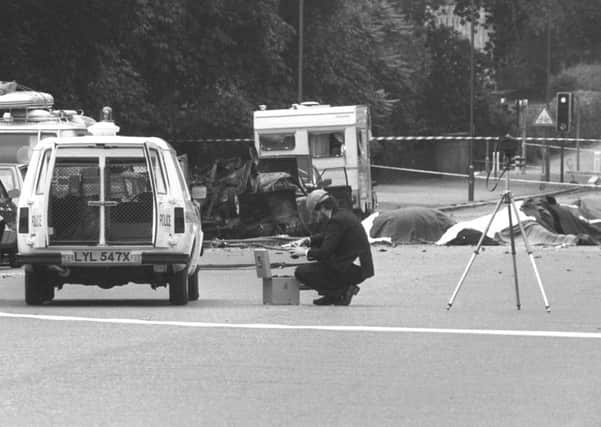Hyde Park victims deserve justice: MP


“Initially the Legal Aid Agency refused legal aid on the frankly incredible grounds that prosecuting Downey would not have any ‘real benefits to the public at large … given the changed circumstances since the Peace Process’,” said Ulster Unionist Danny Kinahan who was best man to one of the four soldiers killed in the 1982 Hyde Park bomb.
After an appeal against the decision was granted, Legal Aid Agency last week told Sarah-Jane Young, the daughter of one of the murdered soldiers, that whilst a prosecution is in fact, in the ‘significant wider public interest,’ it would not grant funding on the basis that the cost of prosecuting the claim against Downey (estimated at just over £300,000) would not be proportionate to the benefits to Ms Young and the British public.
Advertisement
Hide AdAdvertisement
Hide AdMr Kinahan has backed calls for the Government to intervene in a legal aid battle.
Danny Kinahan said the families of the Hyde Park bombing victims deserve justice after a second legal aid request to fund a private prosecution was refused.
Mr Kinahan said: “I am extremely disappointed and angry that a second legal aid request from the daughter of one of the soldiers killed in the Hyde Park bombing has been refused.
“One of those who lost his life that dreadful day was Lance Corporal Jeffrey Young and it is his daughter Sarah-Jane who has been fighting for years now to bring a case against John Downey, so that evidence against him can be heard in open court and to secure a judicial record of his responsibility.”
Advertisement
Hide AdAdvertisement
Hide AdWhen the Hyde Park bombing took the lives of four soldiers in the Household Cavalry, Mr Kinahan was a serving officer in the same regiment.
He said: “One of those murdered that day was Lieutenant Anthony Daly who was married just four weeks previously. I remember that because I was his best man, and shortly after his murder I commanded his burial party.”
The South Antrim MP said: “The Government must intervene to ensure that legal aid is provided in this case. It is simply not good enough that the victims of terrorism have to fight every inch of the way for justice against the very legal system that should be helping them find out the truth and punish the guilty.”
In light of the refusal of legal aid for the second time, he said: “Just how much more suffering do the families have to endure? To deny legal aid to the families of the victims of the Hyde Park bombing, especially when one considers that it was the British Government which granted the so-called ‘letters of comfort,’ which prevented John Downey being questioned in connection with the Hyde Park bombing, is a truly shameful state of affairs.”
Advertisement
Hide AdAdvertisement
Hide AdDowney had been charged with killing four soldiers in the 1982 bombing, but an Old Bailey judge dismissed the case when it emerged the convicted IRA member had a letter granting him immunity from prosecution.
Mr Kinahan went on to say that he would prefer if cases such as Hyde Park could be prosecuted by the state.
He said: “The public should not have to pay to see justice done, private prosecutions should.
• WHAT HAPPENED ON THAT TERRIBLE DAY
On July 20, 1982 four soldiers in the Household Cavalry died when a nail bomb was detonated by remote control as the troopers rode past on horseback.
Advertisement
Hide AdAdvertisement
Hide AdThe case against convicted IRA member John Downey collapsed in February 2014 forcing victims’ families to attempt to bring a private prosecution.
They were refused legal aid in March 2016 as the case was ‘not in the public interest’.
After being allowed to appeal, aid was again refused last week.
While Legal Aid Agency now admitted the case was in the public interest they said it was the cost was ‘not proportionate to the benefits’